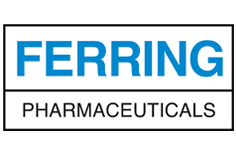Research by 2003 Nobel Laureate in Chemistry Fills in ‘Scientific Gaps’ Necessary for Ferring Researchers to Develop Incontinence Product Focusing on the Kidney
Lausanne, Switzerland – February 27th, 2004 –
Ferring is exploring the links between recent Nobel Prize winning discoveries and its vision to provide better and more sophisticated treatments for those sufferers affected by urinary incontinence, thereby transforming the way the disease is treated.
Nobel Laureate Professor Peter Agre discovered the presence of aquaporins and waterchannels which regulate the water balance in the human body.
Aquaporins serve as channels in the wall of biological cells and have the remarkable ability of conducting water through cells at high rates – up to a billion molecules per second. Researchers hope to one day to be able to influence these channels to provide more direct control of urine production by the kidney.
‘The principles that emerge from aquaporins provide a framework for additional research into treatments and I am very enthusiastic about the prospect of my research inspiring drug development to even greater heights at Ferring,’ said Professor Agre.
Professor Agre’s research has clinical implications in kidney research and will help Ferring further develop newer ‘designer’ compounds that will work on the molecular level and possibly influence aquaporins.
“Attacking the disease at the root, ie. the kidney could make a big difference in patients,” said Dr. Jens Peter Nørgaard, head of urology at Ferring. “Knowledge of aquaporins will give us better insight to create products that will complement the existing drugs: anticholinergics which target a completely different aspect of the disease.”
In the meantime, Professor Agre’s research fills in scientific gaps that have existed previously and provide insight into the mode of action of Ferring’s second generation family of orally active non-peptide vasopressin agonists that act on urine production in the kidney.
One of these compounds, FE 106 483 is currently in phase I clinical development. The hallmarks that distinguish this new generation of compounds are high selectivity for its receptor and high oral availability.
Ferring hosted Professor Agre and other renowned scientists at an R&D Anniversary Symposium at the Ferring International Center in Copenhagen on February 26th 2004 with more than 100 researchers, dignitaries and media in attendance.
Meeting Unmet Needs
It is estimated that 40 million people across Europe suffer from urinary incontinence. Simply put, people who suffer from urinary incontinence, have difficulties holding their urine and very often wet themselves.
Oral anticholinergics are the first-line medical treatment for urinary incontinence, but the effectiveness of these drugs is limited as described in a recently published Cochrane Review.1 It is also known that only a minority of the patients remain on their treatment for a year despite persistent symptoms.
Because there is currently no effective treatment for these disorders, Professor Agre’s work and similar scientific investments in understanding the basic mechanisms of aquaporins may pay off in future treatments, said Professor Paul Abrams, professor of urology in the Department of Urology at Southmead Hospital, Bristol, UK.
Thus, there is room for improvement of the current treatments’ risk/benefit ratio and an unmet medical need for a novel treatment approach.
Ferring researchers believe that returning to the root of the issue -urine production- in the kidney rather than the current practice of solely treating the bladder may be a better way of treating patients.
Professor Agre says that he always believed his research could be used clinically and he is happy that Ferring is one of the first in line to use his discoveries for kidney research that could lead to better treatments for incontinence and other related diseases.
Ferring and Anti-Diuresis
For the last 50 years, Ferring has been one of the world’s leaders in research and development of conditions related to abnormalities in the kidney and related urine production.
Ferring’s flagship urology product for the treatment of bedwetting, desmopressin, is also celebrating its 30th birthday this year. The product is recommended by the World Health Organisation and has been used by millions of children world-wide to control their bedwetting.
To celebrate these ‘anniversaries’ Ferring sponsored a scientific programme yesterday that included some of the most esteemed researchers in kidney disorders and urology including: Professor Gary Robertson Northwestern University, Chicago, US; Professor Paul Abrams from Bristol University, UK and Professor Søren Nielsen from the University of Aarhus, Denmark.
About Ferring Pharmaceuticals
Ferring is a Swiss-based research driven, speciality biopharmaceutical group active in global markets. The company identifies, develops and markets innovative products in the area of urology, obstetrics and infertility, gastroenterology and endocrinology. In recent years Ferring has expanded beyond its traditional European base and now has operating subsidiaries in over 40 countries.
To learn more about Ferring or our products please visit us at
www.ferring.com.
For more information, please contact
Sharmi Albrechtsen
Corporate Communication Manager, Ferring International Center
+45 28 78 72 09
sharmi.albrechtsen@ferring.com
References
-
- BMJ. 2003 Apr 19;326(7394):841-4. Effectiveness of anticholinergic drugs compared with placebo in the treatment of overactive bladder: systematic review. Herbison P, Hay-Smith J, Ellis G, Moore K.

